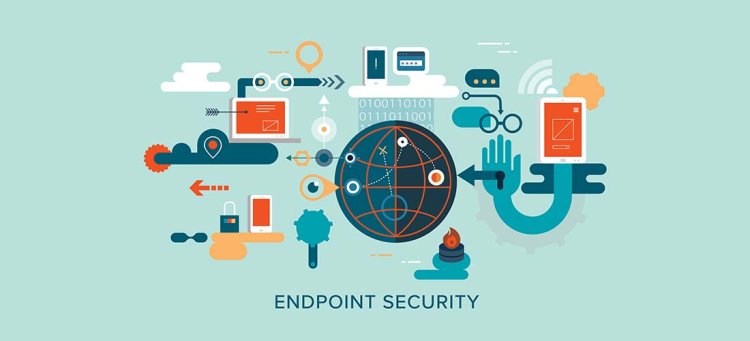What is Endpoint Security?
Endpoint security helps businesses keep the devices that connect to a network secure. By making endpoints the new network perimeter, organizations can prevent risks and detect suspicious activity no matter where employees are.

Jake, the owner of a successful local bakery chain, wasn’t your typical tech guy. He loved baking bread, crafting pastries, and greeting customers at his stores. But as his business grew, he embraced technology to keep everything running smoothly. His employees used tablets for taking orders, laptops for managing inventory, and even his ovens were now smart devices connected to the internet.
Everything was going great—until one day, Jake’s manager called in a panic. “Our ordering system is acting weird,” she said. “Orders are disappearing, and I think there’s something wrong with the tablets.”
That’s when Jake realized he might be facing a cybersecurity issue. He’d heard about “endpoint security” before, but it was time to learn what it actually meant—and why it mattered so much.
A Quick Look: What Are Endpoints?
Jake learned that endpoints are any devices that connect to a network. For his bakery, that meant the tablets used by staff, the laptops in his office, and even his smart ovens. These devices were like doors to his digital business, and if they weren’t secure, hackers could easily sneak in.
That’s where endpoint security comes in. It’s like hiring a digital security guard for every device. Its job? To keep Jake’s business safe from malware, hackers, and other cyber threats.
About more to learn...Endpoint Security in Sydney
Why Endpoints Are Prime Targets
Jake’s bakery chain was growing, but it wasn’t a giant corporation. He figured hackers wouldn’t bother with a small business like his. But he was wrong.
Cybercriminals love targeting small businesses because they often don’t have the same level of protection as larger companies. A single compromised device—like one of Jake’s tablets—could allow hackers to:
- Steal customer payment information.
- Disrupt operations by locking him out of his systems.
- Spread malware across his network.
What Does Endpoint Security Do?
Jake discovered that endpoint security wasn’t just about installing antivirus software—it was a full toolkit for protecting his business. Here’s what it does:
- Stops Malware and Viruses: Blocks harmful programs that try to infect devices.
- Encrypts Sensitive Data: Protects customer and business information so it can’t be read, even if stolen.
- Monitors for Threats: Keeps an eye on devices 24/7 to spot unusual activity.
- Controls Access: Makes sure only authorized employees can access sensitive systems.
- Protects Remote Devices: Ensures devices used outside the bakery, like laptops at home, are just as secure.
Types of Endpoint Security
Jake found there were different options depending on a business’s size and needs:
-
Cloud-Based Endpoint Security:
Ideal for businesses with remote or mobile workers, as it allows devices to be protected from anywhere. -
On-Premises Solutions:
Best for businesses that want to manage everything themselves, often using in-house servers. -
Managed Endpoint Security Services:
Perfect for busy owners like Jake who prefer to let experts handle cybersecurity.
The Day Endpoint Security Saved Jake’s Business
After learning about the risks, Jake worked with an IT consultant to set up a robust endpoint security system. A few weeks later, he got an alert. One of his employee’s tablets had been used to download a suspicious file.
The system immediately blocked the file and isolated the tablet to prevent the issue from spreading. Jake breathed a sigh of relief, knowing his customer data and business operations were safe. Without endpoint security, that small mistake could’ve caused a major disaster.
The Real Cost of Ignoring Endpoint Security
Jake realized how lucky he was to catch the threat early. He learned that the cost of not having endpoint security could be devastating:
- Loss of Trust: Customers wouldn’t come back if they knew their data wasn’t safe.
- Operational Downtime: Fixing a breach could shut down his ordering system for days.
- Financial Losses: Data recovery and legal fees could cost tens of thousands of dollars.
Jake’s Takeaway
Endpoint security became one of Jake’s top priorities. It wasn’t just about protecting devices—it was about safeguarding his dream, his team, and his customers.
“Think of it this way,” Jake told a friend. “You wouldn’t leave your bakery doors unlocked at night, right? Endpoint security is like locking up your business in the digital world.”
Whether you’re running a bakery, an online store, or any other business, endpoint security is essential. It’s the shield that keeps your devices—and your livelihood—safe from harm.
So, what is endpoint security? It’s your business’s first line of defense in a world where cyber threats are everywhere. Jake learned it the hard way, but now his bakery chain is thriving, with both his pastries and his data safe from harm.
FAQs: What is Endpoint Security?
1. What exactly is endpoint security?
Endpoint security refers to tools and practices that protect devices like laptops, tablets, smartphones, and servers (called "endpoints") connected to a network. It prevents cyber threats like malware, viruses, and unauthorized access from harming your devices or business operations.
2. Why is endpoint security important for small businesses?
Small businesses are common targets for cybercriminals because they often lack robust security systems. Endpoint security helps protect sensitive data, ensures smooth business operations, and prevents costly breaches.
3. What’s the difference between antivirus and endpoint security?
Antivirus focuses on protecting a single device from viruses and malware. Endpoint security, on the other hand, provides a broader solution that safeguards all devices in a network and offers features like real-time monitoring, encryption, and access control.
4. How does endpoint security work?
Endpoint security tools monitor devices for suspicious activity, block malicious software, and protect sensitive data using methods like encryption. Some systems also allow remote locking or wiping of devices if they’re lost or compromised.
5. Who needs endpoint security?
Any business that uses connected devices, such as laptops, tablets, or servers, needs endpoint security. This includes small businesses, remote teams, and large enterprises.
What's Your Reaction?





















